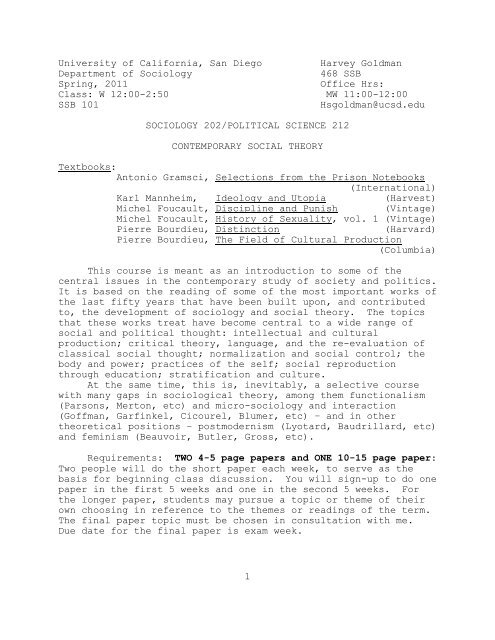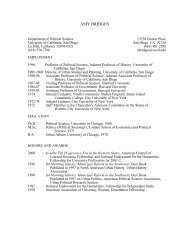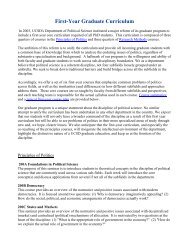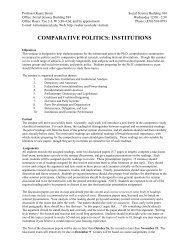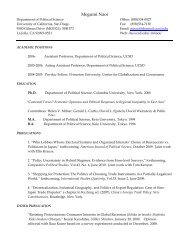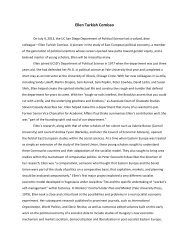Contemporary Sociology Theory - Department of Political Science
Contemporary Sociology Theory - Department of Political Science
Contemporary Sociology Theory - Department of Political Science
Create successful ePaper yourself
Turn your PDF publications into a flip-book with our unique Google optimized e-Paper software.
University <strong>of</strong> California, San Diego<br />
Harvey Goldman<br />
<strong>Department</strong> <strong>of</strong> <strong>Sociology</strong><br />
468 SSB<br />
Spring, 2011<br />
Office Hrs:<br />
Class: W 12:00-2:50 MW 11:00-12:00<br />
SSB 101<br />
Hsgoldman@ucsd.edu<br />
SOCIOLOGY 202/POLITICAL SCIENCE 212<br />
CONTEMPORARY SOCIAL THEORY<br />
Textbooks:<br />
Antonio Gramsci, Selections from the Prison Notebooks<br />
(International)<br />
Karl Mannheim, Ideology and Utopia (Harvest)<br />
Michel Foucault, Discipline and Punish (Vintage)<br />
Michel Foucault, History <strong>of</strong> Sexuality, vol. 1 (Vintage)<br />
Pierre Bourdieu, Distinction (Harvard)<br />
Pierre Bourdieu, The Field <strong>of</strong> Cultural Production<br />
(Columbia)<br />
This course is meant as an introduction to some <strong>of</strong> the<br />
central issues in the contemporary study <strong>of</strong> society and politics.<br />
It is based on the reading <strong>of</strong> some <strong>of</strong> the most important works <strong>of</strong><br />
the last fifty years that have been built upon, and contributed<br />
to, the development <strong>of</strong> sociology and social theory. The topics<br />
that these works treat have become central to a wide range <strong>of</strong><br />
social and political thought: intellectual and cultural<br />
production; critical theory, language, and the re-evaluation <strong>of</strong><br />
classical social thought; normalization and social control; the<br />
body and power; practices <strong>of</strong> the self; social reproduction<br />
through education; stratification and culture.<br />
At the same time, this is, inevitably, a selective course<br />
with many gaps in sociological theory, among them functionalism<br />
(Parsons, Merton, etc) and micro-sociology and interaction<br />
(G<strong>of</strong>fman, Garfinkel, Cicourel, Blumer, etc) – and in other<br />
theoretical positions – postmodernism (Lyotard, Baudrillard, etc)<br />
and feminism (Beauvoir, Butler, Gross, etc).<br />
Requirements: TWO 4-5 page papers and ONE 10-15 page paper:<br />
Two people will do the short paper each week, to serve as the<br />
basis for beginning class discussion. You will sign-up to do one<br />
paper in the first 5 weeks and one in the second 5 weeks. For<br />
the longer paper, students may pursue a topic or theme <strong>of</strong> their<br />
own choosing in reference to the themes or readings <strong>of</strong> the term.<br />
The final paper topic must be chosen in consultation with me.<br />
Due date for the final paper is exam week.<br />
1
I. INTRODUCTION<br />
II. THE MEANINGS OF CULTURE FOR A CRITICAL THEORY<br />
Max Horkheimer, “The Present Situation <strong>of</strong> Social<br />
Philosophy and the Tasks <strong>of</strong> an Institute for<br />
Social Research”, from Between Philosophy and<br />
Social <strong>Science</strong><br />
http://www.marxists.org/reference/archive/horkheimer/1931/present<br />
-situation.htm<br />
Max Horkheimer, “Traditional and Critical <strong>Theory</strong>,” from<br />
Critical <strong>Theory</strong><br />
Max Horkheimer and Theodor Adorno, “The Concept <strong>of</strong><br />
Enlightenment” and “The Culture Industry,”<br />
from Dialectic <strong>of</strong> Enlightenment<br />
Adorno, “Culture Industry Reconsidered,” from<br />
New German Critique 6 (Autumn 1975):12-19<br />
http://www.jstor.org/stable/pdfplus/487650.pdf<br />
III. THE SOCIAL UNDERSTANDING OF KNOWLEDGE<br />
Mannheim, Ideology and Utopia, all<br />
IV. CULTURES, STRUCTURES, AND IDEOLOGIES<br />
Gramsci, Selections from Prison Notebooks, 5-23, 52-61,<br />
102-120, 125-90, 210-18, 227-38, 257-68, 275-76,<br />
343-66, 407-10<br />
Althusser, “Ideology and Ideological State<br />
Apparatuses,” from Lenin and Philosophy<br />
http://www.marx2mao.com/Other/LPOE70ii.html#s5<br />
Habermas, “Technology and <strong>Science</strong> as Ideology,” from<br />
Toward a Rational Society<br />
V-VI. KNOWLEDGE, POWER, AND SOCIAL CONTROL<br />
2
Foucault, Discipline and Punish, all<br />
Foucault, “Two Lectures,” from Power/Knowledge<br />
Foucault, “Truth and Power,” from Power/Knowledge<br />
VII. THE MICROPHYSICS OF POWER/KNOWLEDGE<br />
Foucault, History <strong>of</strong> Sexuality, volume 1, all<br />
Foucault, “The Subject and Power,” from Dreyfus and<br />
Rabinow, Michel Foucault: Beyond Structuralism and<br />
Hermeneutics<br />
VIII-IX. STRATIFICATION AND CULTURAL CAPITAL<br />
Bourdieu, “The Genesis <strong>of</strong> the Concepts <strong>of</strong> Habitus and<br />
Field,” in Sociocriticism 2 (December 1985):11-24<br />
Bourdieu, Distinction, pp. 1-256, 466-500<br />
X. CULTURE AND INTELLECTUAL PRODUCTION<br />
Bourdieu, “Intellectual Field and Creative Project,” in<br />
Social <strong>Science</strong> Information 8 (April, 1969):89-119<br />
http://ssi.sagepub.com/content/vol8/issue2/<br />
Bourdieu, The Field <strong>of</strong> Cultural Production,<br />
pp. 29-73, 112-141, 176-91<br />
3
BIBLIOGRAPHY<br />
CULTURE AND INTERPRETATION<br />
For background on developments in anthropology, see Clifford<br />
Geertz, The Interpretation <strong>of</strong> Cultures, and idem, “`From the<br />
Native’s Point <strong>of</strong> View’: On the Nature <strong>of</strong> Anthropological<br />
Understanding”, in Geertz, Local Knowledge; George E. Marcus and<br />
Michael M.J. Fischer, Anthropology as Cultural Critique; Marshall<br />
Sahlins, Culture and Practical Reason; Pierre Bourdieu, Outline<br />
<strong>of</strong> a <strong>Theory</strong> <strong>of</strong> Practice; and Claude Levi-Strauss, Structural<br />
Anthropology. For a different perspective, see James Clifford &<br />
George Marcus, Writing Culture, especially the essays by<br />
Crapanzano (a critique <strong>of</strong> Geertz’s “Deep Play”), Marcus, and<br />
Rabinow.<br />
An adequate treatment <strong>of</strong> hermeneutics can be found in<br />
Richard Palmer, Hermeneutics. A history <strong>of</strong> the origin <strong>of</strong> the<br />
hermeutical tradition in biblical interpretation can be found in<br />
Hans Frei, The Eclipse <strong>of</strong> Biblical Narrative. Hans-Georg<br />
Gadamer’s Truth and Method remains the standard modern work. On<br />
Gadamer, see the chapter in Quentin Skinner, ed., The Return <strong>of</strong><br />
Grand <strong>Theory</strong> in the Human <strong>Science</strong>s; and David Hoy, The Critical<br />
Circle. Further, Martin Jay, “Should Intellectual History Take a<br />
Linguistic Turn? Reflections on the Gadamer-Habermas Debate”, in<br />
LaCapra and Kaplan, eds., Modern European Intellectual History.<br />
Also Nelson Goodman, Ways <strong>of</strong> Worldmaking. See also the editors’<br />
introduction to Paul Rabinow and William Sullivan, eds.,<br />
Interpretive Social <strong>Science</strong>. A Reader. See also Paul Ricoeur,<br />
Hermeneutics and the Human <strong>Science</strong>s and idem, The Conflict <strong>of</strong><br />
Interpretations; also Hayden White, Tropics <strong>of</strong> Discourse.<br />
GENERAL WORKS IN SOCIAL THEORY, HISTORY, AND PHILOSOPHY<br />
There are general textbook surveys <strong>of</strong> contemporary social<br />
theory, which provide useful outlines and key themes <strong>of</strong> the<br />
subject. See Randall Collins, Theoretical <strong>Sociology</strong>, Jonathan<br />
Turner, The Structure <strong>of</strong> Sociological <strong>Theory</strong>, Richard Munch,<br />
Sociological <strong>Theory</strong>, vols. 2 and 3, George Ritzer, <strong>Contemporary</strong><br />
Sociological <strong>Theory</strong>, Malcolm Waters, Modern Sociological <strong>Theory</strong>,<br />
and Ian Craib, Modern Social <strong>Theory</strong>. Also Jeffrey Alexander,<br />
Twenty Lectures: Sociological <strong>Theory</strong> Since World War II and<br />
Randall Collins, <strong>Sociology</strong> Since Mid-century.<br />
MARXISM AND CRITICAL THEORY<br />
On Marxism after Marx, Perry Anderson’s Considerations on<br />
Western Marxism is an interesting overview, with some<br />
substantive analysis <strong>of</strong> the arguments <strong>of</strong> those thinkers<br />
considered as parts <strong>of</strong> “Western Marxism”. Dick Howard, The<br />
4
Marxian Legacy deals with some <strong>of</strong> the same figures, like Merleau-<br />
Ponty and Habermas, but is rather opaque. David McLellan,<br />
Marxism after Marx is extremely light in its overview, but<br />
mentions nearly everyone <strong>of</strong> importance. John Roemer, ed.,<br />
Analytical Marxism is a collection <strong>of</strong> essays focusing on<br />
structural and analytical issues and on a number <strong>of</strong> different<br />
themes in contemporary Marxism. The most influential <strong>of</strong> the<br />
French thinkers is Louis Althusser. See his For Marx and<br />
Althusser et al., Reading Capital. Althusser’s essay “Ideology<br />
and Ideological State Apparatuses,” in Lenin and Philosophy, is<br />
also valuable. On Althusser, see Gregory Elliott, Althusser: A<br />
Critical Reader; and E.P. Thompson, The Poverty <strong>of</strong> <strong>Theory</strong>. The<br />
first two volumes <strong>of</strong> a multi-volume biography <strong>of</strong> Althusser have<br />
now appeared in French, written by Yann Moulier Boutang.<br />
On critical theory generally, see Martin Jay, The<br />
Dialectical Imagination, Susan Buck-Morss, The Origins <strong>of</strong><br />
Negative Dialectics; David Held, Introduction to Critical <strong>Theory</strong>;<br />
Helmut Dubiel, <strong>Theory</strong> and Politics; and Rolf Wiggershaus, The<br />
Frankfurt School. For short pieces by members <strong>of</strong> the Frankfurt<br />
School, see Andrew Arato and Eike Gebhardt, eds., The Essential<br />
Frankfurt School Reader, and Stephen Bronner and Douglas Kellner,<br />
eds., Critical <strong>Theory</strong> and Society: A Reader. Apart from<br />
Horkheimer, the other great philosophical founder <strong>of</strong> critical<br />
theory is Theodor Adorno, who wrote, with Horkheimer, Dialectic<br />
<strong>of</strong> Enlightenment, as well as a serious critique <strong>of</strong> modern<br />
philosophy, Negative Dialectics. On Adorno, see Martin Jay,<br />
Adorno; Susan Buck-Morss, The Origin <strong>of</strong> Negative Dialectics,<br />
which also deals with the critical theorist and literary critic<br />
Walter Benjamin; and Gillian Rose, The Melancholy <strong>Science</strong>. On<br />
Adorno as aesthetic theorist, with sections also on Lukacs,<br />
Bloch, Benjamin, and Sartre, see Frederic Jameson, Marxism and<br />
Form. See also Eugene Lunn, Marxism and Modernism.<br />
Habermas early works are both historical and philosophical.<br />
See The Structural Transformation <strong>of</strong> the Public Sphere and<br />
Knowledge and Human Interests. The best general work on Habermas<br />
is still Thomas McCarthy, The Critical <strong>Theory</strong> <strong>of</strong> Jürgen Habermas.<br />
See also the interview with Habermas in New Left Review 151<br />
(1985), pp. 75-105, and the collection <strong>of</strong> interviews Autonomy and<br />
Solidarity: Interviews, edited by Peter Dews.<br />
There are a number <strong>of</strong> political theorists who have written<br />
about Habermas, among them Simone Chambers, Reasonable Democracy:<br />
Jurgen Habermas and the Politics <strong>of</strong> Discourse, and Stephen K.<br />
White, The Recent Work <strong>of</strong> Jurgen Habermas: reason, justice, and<br />
modernity. Craig Calhoun, ed., Habermas and the Public Sphere,<br />
raises the political questions among sociologists. Two useful<br />
collections <strong>of</strong> essays are Axel Honneth and Hans Joas, eds.,<br />
Communicative Action: Essays on Jurgen Habermas’s <strong>Theory</strong> <strong>of</strong><br />
Communicative Action; Stephen K. White, ed., The Cambridge<br />
5
Companion to Habermas; and Richard J. Bernstein, ed., Habermas<br />
and Modernity.<br />
Habermas’ Philosophical Discourse <strong>of</strong> Modernity is a set <strong>of</strong><br />
lectures that attacks a whole series <strong>of</strong> developments in French<br />
thought, including the work <strong>of</strong> Foucault. On this issue, see<br />
Foucault contra Habermas: Recasting the Dialogue between<br />
Genealogy and Critical <strong>Theory</strong>, ed. by Samantha Ashenden and David<br />
Owen; Michael Allen, ed., Critique and Power: Recasting the<br />
Foucault-Habermas Debate, and Noelle McAfee, Habermas, Kristeva,<br />
and Citizenship.<br />
STRUCTURALISM AND POST-STRUCTURALISM<br />
On structuralism, see now the fascinating work by François<br />
Dosse, History <strong>of</strong> Structuralism, 2 volumes. Also Jean Piaget,<br />
Structuralism, who, among other things, criticizes Foucault.<br />
Richard Harland, Super-structuralism is quite interesting,<br />
although at times obscure. On structuralism in literary<br />
analysis, see Roland Barthes, Writing Degree Zero, Jonathan<br />
Culler, Structuralist Poetics, and Frederic Jameson, The Prison-<br />
House <strong>of</strong> Language. On anthropology, see Simon Clarke, The<br />
Foundations <strong>of</strong> Structuralism, Claude Levi-Strauss, Structural<br />
Anthropology, Edmund Leach, Claude Levi-Strauss, and Marcel<br />
Henaff, Claude Levi-Strauss.<br />
Vincent Descombes, Modern French Philosophy, is a brief but<br />
entertaining overview <strong>of</strong> recent French thinkers. Luc Ferry and<br />
Alain Renaut, French Philosophy <strong>of</strong> the Sixties, is a conservative<br />
and rather simple critique <strong>of</strong> the same thinkers. Jürgen Habermas<br />
provides a trenchant critique <strong>of</strong> the “Nietzschean current” in<br />
France in his The Philosophical Discourse <strong>of</strong> Modernity, with<br />
chapters on Foucault and Derrida, among others. Martin Jay,<br />
Downcast Eyes: The Denigration <strong>of</strong> Vision in Twentieth-Century<br />
French Thought, is an unusual and ingenious investigation <strong>of</strong><br />
recent French thought from the point <strong>of</strong> view <strong>of</strong> its “antiocularcentric”<br />
attitude toward “seeing”.<br />
Mark Poster, Critical <strong>Theory</strong> and Post-structuralism, is a<br />
defense <strong>of</strong> recent trends in postmodernism. Other works covering<br />
similar developments are Charles Lemert, French <strong>Sociology</strong> since<br />
1968; Scott Lash, <strong>Sociology</strong> <strong>of</strong> Postmodernism; Nancy Fraser,<br />
Unruly Practices; Allan Megill, Prophets <strong>of</strong> Extremity; John<br />
Fekete, ed., The Structural Allegory: Reconstructive Encounters<br />
with the New French Thought; and Peter Dews, Logics <strong>of</strong><br />
Disintegration. See also Jerrold Seigel, “La mort du sujet:<br />
origines d’un thème,” in DEBAT 58 (January-February 1990): 160-<br />
169.<br />
6
FOUCAULT<br />
Foucault’s many essays and interviews are collected in a<br />
four-volume set, Dits et Écrits, from which a selection has been<br />
published in English in three volumes.<br />
There are now three biographies <strong>of</strong> Foucault: Didier Eribon,<br />
Michel Foucault; James Miller, The Passion <strong>of</strong> Michel Foucault,<br />
and most recently, David Macey, The Lives <strong>of</strong> Michel Foucault.<br />
There is even a French roman à clef, in which Foucault appears<br />
under another name: Hervé Guibert, A l’ami qui ne m’a pas sauvé<br />
la vie.<br />
There are a number <strong>of</strong> books <strong>of</strong> interviews with Foucault,<br />
which <strong>of</strong>ten explain his work better than the works themselves.<br />
The most important is Power/Knowledge. See also Foucault,<br />
Politics, Philosophy, Culture: Interviews and other Writings,<br />
1977-1984; idem, Foucault Live; and James Bernauer and David<br />
Rasmussen, eds., The Final Foucault, which also has an excellent<br />
bibliography <strong>of</strong> Foucault’s writings. Foucault, Language,<br />
Counter-Memory, Practice, contains essays by and interviews with<br />
Foucault. See also the interview with Foucault and the afterward<br />
by him, included in Dreyfus and Rabinow, Michel Foucault: Beyond<br />
Structuralism and Hermeneutics, 2d ed. Luther H. Martin, Huck<br />
Gutman, Patrick H. Hutton, eds., Technologies <strong>of</strong> the Self: A<br />
Seminar with Michel Foucault, contains two interesting essays by<br />
Foucault and a fascinating interview. Foucault, Power, Truth,<br />
Strategy contains some interesting pieces and an interview. See<br />
also Graham Burchell, Colin Gordon, and Peter Miller, eds., The<br />
Foucault Effect: Studies in Governmentality, which includes two<br />
lectures by and an interview with Foucault, and essays by others<br />
as well.<br />
Foucault began his career with a great interest in<br />
psychiatry and mental illness, in Mental Illness and Psychology.<br />
His interest became more oriented toward the history <strong>of</strong> madness<br />
in Madness and Civilization. He then turned toward the study <strong>of</strong><br />
knowledge in Order <strong>of</strong> Things and The Archaeology <strong>of</strong> Knowledge.<br />
His “third period” begins with Discipline and Punish, his<br />
principal work on power. The History <strong>of</strong> Sexuality, Volume 1,<br />
which has as its subtitle in the French original, The Will to<br />
Knowledge, is the sequel to Discipline and Punish. For more on<br />
power, see “Truth and Power” and “Two Lectures,” in Foucault,<br />
Power/Knowledge. The succeeding volumes <strong>of</strong> the History <strong>of</strong><br />
Sexuality are in fact great departures, restoring the importance<br />
<strong>of</strong> the self and its shaping: The Uses <strong>of</strong> Pleasure and The Care <strong>of</strong><br />
the Self.<br />
Hubert L. Dreyfus and Paul Rabinow, Michel Foucault: Beyond<br />
Structuralism and Hermeneutics, 2d ed., is still probably the<br />
best general work in English so far on Foucault. There is also<br />
the excellent work <strong>of</strong> Gilles Deleuze, Foucault, which is now in<br />
English, though it is difficult. Roy Boyne, Foucault and<br />
7
Derrida: The other side <strong>of</strong> reason, attempts some comparisons.<br />
There are two largely introductory books on Foucault by Barry<br />
Smart, Michel Foucault, and Foucault, Marxism, and Critique.<br />
Gary Gutting, Michel Foucault’s Archaeology <strong>of</strong> Scientific Reason<br />
is a study <strong>of</strong> Foucault that explores his roots in French<br />
philosophy and history <strong>of</strong> science. Michèle Barrett, The Politics<br />
<strong>of</strong> Truth: From Marx to Foucault, examines Foucault as a critic <strong>of</strong><br />
the concept <strong>of</strong> ideology. James W. Bernauer, Michel Foucault’s<br />
Force <strong>of</strong> Flight: Toward and Ethics for Thought examines thinking<br />
as a form <strong>of</strong> “practice.” Among more specialized works, see Simon<br />
During, Foucault and Literature; Stephen J. Ball, ed., Foucault<br />
and Education, and John Caputo and Mark Yount, eds., Foucault and<br />
the Critique <strong>of</strong> Institutions.<br />
There are many collections <strong>of</strong> essays on Foucault. Gary<br />
Gutting ed., The Cambridge Companion to Foucault, has a wide<br />
range <strong>of</strong> perspectives. Arnold I. Davidson, ed., Foucault and His<br />
Interlocutors collects a number <strong>of</strong> pieces on Foucault by his<br />
colleagues. See also David Couzens Hoy, ed., Foucault: A<br />
Critical Reader, which includes comments by a number <strong>of</strong><br />
interesting thinkers, including Habermas and Edward Said. Mike<br />
Gane, ed., Towards a Critique <strong>of</strong> Foucault proposes critical<br />
perspectives. Jonathan Arac, ed., After Foucault: Humanistic<br />
Knowledge , Postmodern Challenges has essays by a diverse group,<br />
including Sheldon Wolin.<br />
On Foucault’s relevance for history and historical<br />
sociology, see Jan Goldstein, ed., Foucault and the Writing <strong>of</strong><br />
History, Mitchell Dean, Critical and Effective Histories:<br />
Foucault’s Methods and Historical <strong>Sociology</strong>, and Mike Gane and<br />
Terry Johnson, eds., Foucault’s New Domains. There are several<br />
works on Foucault from a feminist perspective: Jana Sawicki,<br />
Disciplining Foucault: Feminism, Power, and the Body; and Irene<br />
Diamond and Lee Quinby, eds., Feminism and Foucault.<br />
There is an essay on the early Foucault by Derrida, “Cogito<br />
and the History <strong>of</strong> Madness,” in Writing and Difference. For<br />
another critique <strong>of</strong> Foucault’s work on madness, see Andrew Scull,<br />
Social Order/Mental Disorder, and idem, “Michel Foucault’s<br />
history <strong>of</strong> madness,” in History <strong>of</strong> the Human <strong>Science</strong>s 3 (1990).<br />
On the problem <strong>of</strong> the self in the late Foucault and in Weber, see<br />
Pasquale Pasquino, “Michel Foucault (1926-1984): La volonta’ de<br />
sapere,” in Quaderni Piacentini, number 14 (1984), and Harvey<br />
Goldman, Politics, Death, and the Devil.<br />
Chapters on Foucault appear in Habermas, The Philosophical<br />
Discourse <strong>of</strong> Modernity, Michel de Certeau, Heterologies, Ge<strong>of</strong>frey<br />
Galt Harpham, The Ascetic Imperative in Culture and Criticism,<br />
Hayden White, Tropics <strong>of</strong> Discourse, and idem, The Content <strong>of</strong> the<br />
Form; and Edward Said, Beginnings, and idem, The World, the Text,<br />
and the Critic. See also Dominick LaCapra and Steven Kaplan,<br />
eds., Modern European Intellectual History. Praxis<br />
8
International, number 6 (1986), has some essays on Foucault and<br />
the Frankfurt School by Reiner Schürmann and David Ingram.<br />
There have been a series <strong>of</strong> interesting debates on Foucault<br />
in <strong>Political</strong> <strong>Theory</strong>; see volume 12, May, 1984, volume 13, August,<br />
1985, and volume 15, February 1987. Michael Walzer attacks<br />
Foucault in Walzer, “The Politics <strong>of</strong> Michel Foucault,” Dissent,<br />
Fall, 1983, now in Walzer, The Company <strong>of</strong> Critics. For an<br />
analysis <strong>of</strong> Foucault and rationality, see John O’Neill, “The<br />
disciplinary society: from Weber to Foucault,” in British Journal<br />
<strong>of</strong> <strong>Sociology</strong> (37) 1986. A very interesting critique is by Thomas<br />
McCarthy, Habermas’ translator: “The Critique <strong>of</strong> Impure Reason:<br />
Foucault and the Frankfurt School,” <strong>Political</strong> <strong>Theory</strong> 18 (1990),<br />
now in McCarthy, Ideals and Illusions.<br />
On the theme <strong>of</strong> justice, see Foucault’s debate with Noam<br />
Chomsky, “Human Nature: Justice versus Power,” in Fons Elder,<br />
ed., Reflexive Water: The Basic Concerns <strong>of</strong> Mankind. It is now<br />
included also in Davidson, Foucault and his Interlocutors. On<br />
this debate, see Harold Weiss, “The Genealogy <strong>of</strong> Justice and the<br />
Justice <strong>of</strong> Genealogy,” in Philosophy Today 33 (1989).<br />
There are many works on the body that have been influenced<br />
by Foucault. Among them, see Francis Barker, The Tremulous Body:<br />
Essays in Subjection. On Foucault’s conception <strong>of</strong> the subject,<br />
see Jerrold Seigel, “Avoiding the Subject: A Foucaultian<br />
Itinerary,” in Journal <strong>of</strong> the History <strong>of</strong> Ideas 51 (1990). On<br />
Foucault and cruelty, see James Miller, “Carnivals <strong>of</strong> Atrocity:<br />
Nietzsche, Foucault, Cruelty,” <strong>Political</strong> <strong>Theory</strong> 18 (1990).<br />
BOURDIEU<br />
Bourdieu’s general theory was expounded in its first version<br />
in Outline <strong>of</strong> a <strong>Theory</strong> <strong>of</strong> Practice. The Logic <strong>of</strong> Practice is the<br />
revised version <strong>of</strong> this book. Bourdieu’s roots are in structural<br />
anthropology, which plays a large part in these works as well.<br />
On the origins <strong>of</strong> Bourdieu’s work, see “`Fieldwork in<br />
Philosophy,’” and “Landmarks,” in Bourdieu, In Other Words.<br />
Bourdieu has a number <strong>of</strong> brief essays collected in In Other<br />
Words. Bourdieu’s work began in studies <strong>of</strong> Algeria, then moved<br />
on to studies <strong>of</strong> art and culture. See Photography, The Love <strong>of</strong><br />
Art, and Distinction. For a recent collection <strong>of</strong> his work on<br />
art, see Bourdieu, The Rules <strong>of</strong> Art. A good essay on this subject<br />
is Hans-Peter Müller, “Kultur, Geschmack und Distinktion:<br />
Grundzüge der Kultursoziologie Pierre Bourdieu’s,” in Kultur und<br />
Gesellschaft, Special Issue 27 (1986). For the influence on<br />
Bourdieu <strong>of</strong> Heidegger and Nietzsche, see Bourdieu, The <strong>Political</strong><br />
Ontology <strong>of</strong> Martin Heidegger. The most recent <strong>of</strong> his works<br />
published in English are Practical Reason, a collection <strong>of</strong> essays<br />
on a range <strong>of</strong> subjects, including the state, and Pascalian<br />
Meditations, a wide-ranging reflection on themes <strong>of</strong> culture and<br />
9
society that also criticizes modern social and political thought<br />
in Habermas and John Rawls.<br />
On cultural capital, see The State Nobility, which is a<br />
study <strong>of</strong> the French ruling classes and their training and<br />
reproduction. For his own analysis <strong>of</strong> the French academic scene,<br />
in which he and Foucault were major players, see Bourdieu, Homo<br />
Academicus. Although his first work on education and<br />
socialization is The Inheritors, his most advanced work on the<br />
same subject is Bourdieu and Jean-Claude Passeron, Reproduction<br />
in Education, Society and Culture, now in a second edition. See<br />
also Bourdieu, et al., Academic Discourse.<br />
Bourdieu reflected a great deal on method, and even wrote a<br />
kind <strong>of</strong> introductory book on it, The Craft <strong>of</strong> <strong>Sociology</strong>. On his<br />
method, see Bourdieu and Loic Wacquant, An Introduction to<br />
Reflexive <strong>Sociology</strong>, which has theoretical articles, the record<br />
<strong>of</strong> a workshop, and a good bibliography.<br />
There are still only a few books in English devoted<br />
exclusively to Bourdieu: Derek Robbins, The Work <strong>of</strong> Pierre<br />
Bourdieu, and Richard Jenkins, Pierre Bourdieu. See also the<br />
valuable collection <strong>of</strong> Craig Calhoun et al, eds., Bourdieu:<br />
Critical Perspectives. There are a number <strong>of</strong> articles and essays<br />
on Bourdieu in English. Among them, see Michel de Certeau,<br />
“Foucault and Bourdieu,” in his The Practice <strong>of</strong> Everyday Life;<br />
Bennett Berger, “Taste and Domination,” AJS 91 (1986); Rogers<br />
Brubaker, “Rethinking Classical Social <strong>Theory</strong>: The Sociological<br />
Vision <strong>of</strong> Pierre Bourdieu,” <strong>Theory</strong> and Society 14 (1985); and<br />
Paul DiMaggio, “Review Essay on Pierre Bourdieu,” AJS 84 (1979).<br />
See also John J. MacAloon, “A Prefatory Note to Pierre Bourdieu’s<br />
`Program for a <strong>Sociology</strong> <strong>of</strong> Sport,’” <strong>Sociology</strong> <strong>of</strong> Sport Journal 5<br />
(1988), followed by an essay <strong>of</strong> Bourdieu’s. On Bourdieu’s<br />
relation to classical social theory, see Harvey Goldman, “The<br />
Uses <strong>of</strong> Weber in <strong>Contemporary</strong> <strong>Sociology</strong>,” <strong>Theory</strong> and Society, 22<br />
(1993). For critiques <strong>of</strong> Bourdieu, see Randall Collins,<br />
<strong>Sociology</strong> at Mid-Century, and Jeffrey Alexander, Fin-de-siècle<br />
Social <strong>Theory</strong>.<br />
10


